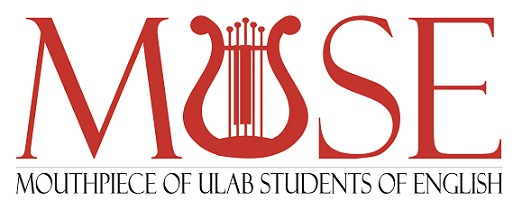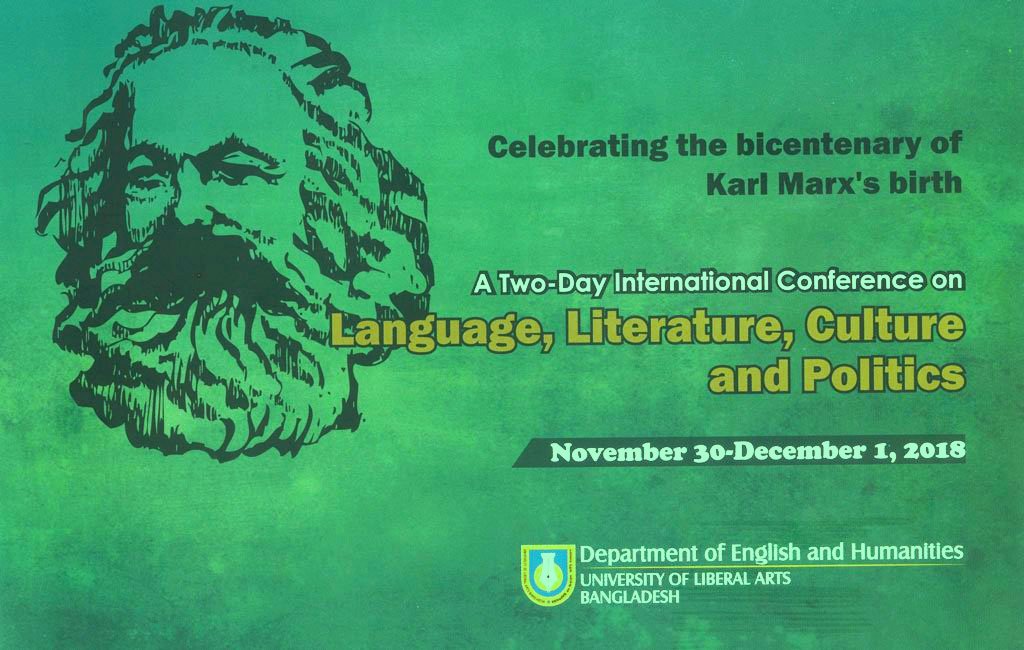Event of the Year
Fairoz Anika
ULAB celebrated the great philosopher Karl Marx’s 200 years of birthday celebration through Marx’s Bicentenary Conference which was organized by the Department of English and Humanities. It was a 2-day Conference which was held from 30th November to 1st December and provided insightful discussions on different debatable issues from Marxist perspectives. Throughout the two days, panel discussions were attended by experts of different sectors. In four parallel sessions presentations were held and chaired by renowned academics, with around 35 young scholars presenting their research on varied topics such as culture, education, ecology, political economy, etc. Different captivating sessions including various parallel and plenary sessions were held which emphasized the inter-connection of Language, Literature, Culture and Politics through various forms of Marxist ideologies.
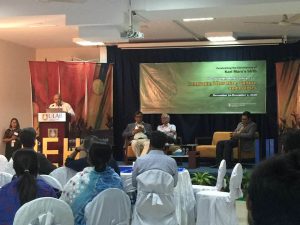
There were many remarkable plenary, panel and parallel-sessions where some of the best scholars of our country as in Professor Shamsad Mortuza, Professor Kaiser Haq, Professor Salimullah Khan and many others presented their thoughts on different issues, reevaluating Marx as he is in the postmodern context of a gloacalized world.
On the first day, Bret Benjamin who was the keynote speaker of this conference, presented his speech, titled “Living amidst the Catastrophes of “the Living Contradiction: Theses on Marx 200” through some excerpts of Karl Marx’s book named, Grundisse where he emphasized the importance of Marx’s theories in the present society, implying that the people of the present time face various crises due to class struggle, social inequalities, and so on more than Marx’s time and mentioned that Marx referred capital as “the living contradiction” in his book. Regarding the need of Marxist ideologies in today’s catastrophic world, Benjamin quoted, “As much as his revolutionary proclamations matter, it is Marx’s eminent critique of capital flaws of notion that remains indispensable for our present society.”
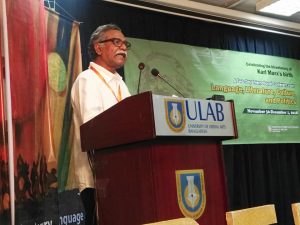
Another fascinating plenary session was conducted by Professor Salimullah Khan named, “Marx after Fanon: Whatever Happened to Alienation?” While talking about Fanon he introduced references of Marxist Ideologies, showing how both emphasized the issues of racism in their individual works. Dr. Salimullah Khan discussed that how Fanon showed the ill-treatment towards the Jews who were always termed as evil and dominated by those who disregard people due to racial differences. Before Fanon, Marx also talked about this same idea of alienation, implying that in negative social circumstances the Jews were treated like slaves in hands of the power-mongers. Emphasizing the importance of Fanon to understand the proletariats’ lives, Dr. Khan quoted, “If you take something out of a context and say that Fanon did not support the working class then that would be a traumatized truth.”
Then there was an interesting parallel session titled, “Empathy, Antipathy and Classroom Teaching and Learning” where the presenters focused on how a healthy teaching and learning environment could be created so that students belonging to various social classes and even those who are handicapped could gain knowledge through proper interaction with others and critical thinking. This chair of this session was Professor Golam Sarwar Chowdhury.

The first day ended with the most anticipating session of Professor Kaiser Haq titled, “Creative Explorations of Marx” where he presented his paper named, “Karl Marx Vs. Nux Vomica 200” and recited some of his selected poems. In this session, Kaiser Haq discussed how homeopathy and allopathy are prominent in South-East Asia and Western Countries and implied in most cases homeopathy is given less importance than allopathy which indirectly refers to the dominance of allopathy over homeopathy. Later on, Homeopathy was prioritized due to its vitality and also was widely used among many famous people. But, Kaiser Haq states, “Karl Marx definitely belongs in allopathy means.” He then went on to read out a story from a book, which dealt between a son and father where the son was a non-believer of homeopathy in opposite to the father. The emphasis of Homeopathy was seen, though, when the son at last agreed to use homeopathy as a means of cure after various circumstances.
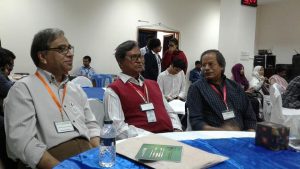
The second day started with a refreshing plenary session conducted by Professor Shamsad Mortuza which was titled “Meghnadhbodh Rohoshya and Naxalgia” and this presentation was based on the movie named, “Meghnadhbodh Rohoshya” where the Naxalite Movement was emphasized. The movie employs a meta-narrative style and basically deals with the complications of the life of a sci-fi writer named Asimava Bose who wrote a book named, “Big Bong Theory” based on the Naxalite Movement. He received a book as a gift named, “Meghnadhbodh Kabbo” from an unnamed person and the name refers to Michael Madhushudan Datta’s famous epic. After that, Asimava faces several obstacles which lead him to betray his closed ones, thus aggravating his sufferings.
The movie is a story within a story and Professor Mortuza showed the theme of Marx’s dialectics using different key-points of the story, such as- the idea of two stories, referring to a story within a story which implies the story of Asimava’s writing and story of his own self; idea of two escapes that refers to his first escape during 1971 when he betrayed his friends and the other escape refers to the time when he suddenly disappears. Thus, Mr. Mortuza connected Marxist ideologies with the movie and said, “This movie will open up debate related to Marxist Ideologies and rewrite the epic again and again.”
Professor Dr. Fakrul Alam also held a plenary speech titled, “Karl Marx on India: A Post-Colonial Perspective” where he showed the astonishing knowledge of Karl Marx related to the political and socio-economical history of India during the British Colonial period and how Marx felt the sufferings of Indians in those times and condemned the British during Sepoy Mutiny. Dr. Alam emphasized Marx’s mastery of details of Indian history, land laws and topography, underscoring the rhetorical persuasiveness with which he makes his case against British rule in India. Dr. Alam concludes by stating that all students can benefit by studying Marx’s pioneering role in critiquing British
colonial rule in India.
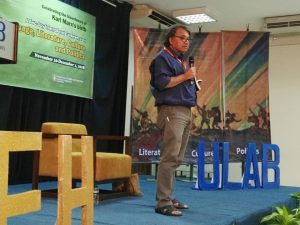
After that, parallel sessions were held among which one was titled, “Education and Society” where three presenters gave presentations on some burning issues of today’s society. One of the presenters, Abritty Abdullah who is a senior lecturer at DEH, ULAB gave a presentation titled, “The Social Justice Eyewash: Experiences of International Graduate Students in a Gender, Race and Cultural Studies Course.” There she shared some experiences of her friends and classmates along with her own about issues related to racial discriminations. She emphasized the partiality towards the students in the US while she studied there as an immigrant. She told that even those who were not immigrants faced similar problems due to not being the White Americans and it forced the concerned individuals “to shut themselves in boxes.” She stated that since education is the practice of freedom and openness of mind, so an impartial environment should be provided for all, hinting at the social justice through a Marxist approach.
In the end, a soothing musical performance was shown by Arup Rahee. Finally, the Convener of the Event, Hasan-Al-Zayed gave a heartfelt speech thanking all the people who have given such a great effort in order to make this conference successful.
